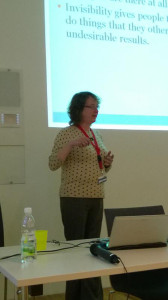In Vienna last week for conference, the vast majority of delegates spoke German rather than English. In a world of Google Translate, I get so used to being able to translate things at a click, I forget that sometimes communication barriers still exist and it can be tricky to get by in another country where your best phrase is “Ruffen Sie ein taxi bitte; Ich bin spät für ein flug”, and that phrase only exists in your head due to a 1990’s comedy sketch.
And one can’t even use that since the Viennese will then helpfully get you a taxi at the start of your presentation…
I talk quickly when presenting – I can’t help it, and usually have a plant at the back of the room to flap their hands around during my talks to indicate when I am rushing. I also forget to breathe, which obviously creates its own issues. My slides often help attendees get what I am saying, but they are usually only headlines of the point I am trying to get across. So once I am warmed to my theme, I have to remember to slow down, breathe, and not rely on my slides. Those who have seen me speak professionally know that my passion for my topic often takes over my ability to coherently impart a theory or demonstrate a point.
So one would think that a German audience, however fluent in my language (very), would struggle to grab the concepts I was discussing. I can barely say Solipsistic Introjection, let alone convey all that means within one slide and my rushed passionate discussion of it. Yet no-one in the room struggled with that at all, or indeed many of the other English phrases I use in my work when discussing the Online Disinhibition Effect (my title was The Virtual Self – Psychological Aspects of Disinhibition).
There was one word, however, for which neither my voice nor my slide helped understanding between the two languages, and that was “trolling”. Here’s a neat Wikipedia entry for it:
“In Internet slang, a troll … is a person who sows discord on the Internet by starting arguments or upsetting people, by posting inflammatory, extraneous, or off-topic messages in an online community (such as a forum, chat room, or blog) with the deliberate intent of provoking readers into an emotional response or of otherwise disrupting normal on-topic discussion.”
I can’t tell you the equivalent phrase my audience came up with in German, since we’ve established that any attempt of mine to speak it results in my suddenly going to the airport, but I did look it up once I got home.
And here’s a great answer:
“A troll is a mythological monster. The German word for Troll is Troll, so there is no difference.
As for the activity of trolling: This is an artificial word created for this purpose, so there is no direct translation we can use. However, trolling means something like ködern. […] So I would go for that.”
And what result did that very useful forum post get? A great example of internet forum trolling from all over the world, focusing on whether all words are artificial in the end. Might turn my blog comments off for this post…
I love the Internet 😉

